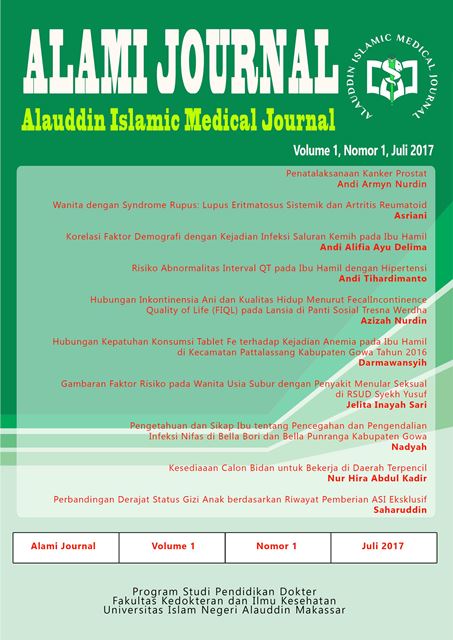Religious Knowledge and Breastfeeding Mothers Status in Indonesia
Abstrak
The high rate of stunting is one of the nutritional problems in Indonesia. Stunting is a condition in which Indonesian children do not achieve optimal height according to the age. Attention to the first 1,000 days of life particularly promotion of breast-feeding for two full years is regarded as a solution to solve this problem. This study aims to examine the relationship of religious knowledge related with breastfeeding encouragement in the Koran and the status of breastfeeding mothers. This research was a quantitative and qualitative research. The data collection was done by cross sectional in Makassar and Palopo on mothers of children aged 12-36 months. The results showed that there were 98 mothers fulfill selection criteria. 83 mothers (84.7%) knew the advice to breastfeed in the Qur'an, while 15 mothers (15.3%) did not know. In addition, there were 57 mothers (58.2%) still breast-feeding, and 41 (41.8%) had stopped breastfeeding by p = 0.007. Finally, this study confirmed that religious suggestion to enhance breast-feeding for two years proved to be a boost to the mother to breastfeed her child.Referensi
Aarts, C., Kylberg, E., Hörnell, A., Hofvander, Y., Gebre-Medhin, M., & Greiner, T. 2000. How exclusive is exclusive breastfeeding? A comparison of data since birth with current status data. International Journal of epidemiology 29(6): 1041-1046.
Abuidhail, J., Al-Modallal, H., Yousif, R., & Almresi, N. 2014. Exclusive breast feeding (EBF) in Jordan: Prevalence, duration, practices, and barriers. Midwifery 30(3): 331-337.
Agunbiade, O. M., & Ogunleye, O. V. 2012. Constraints to exclusive breastfeeding practice among breastfeeding mothers in Southwest Nigeria: implications for scaling up. International breastfeeding journal 7(1), 5.
Akbarzadeh, M., Bahmani, N., Moatari, M., & PourAhmad, S. 2013. The impact of the BASNEF educational programme on breastfeeding behaviour in Iran. British Journal of Midwifery 21(4).
Ballard, O., & Morrow, A. L. 2013. Human Mil Composition: Nutrients and Bioactive Factors. Pediatr Clin North Am: 49-74.
Bayyenat, S., Hashemi, G., Amirhosein, S., Purbaferani, A., Saeidi, M., & Khodaee, G. H. 2014. The importance of breastfeeding in Holy Quran. International Journal of Pediatrics 2(4.1): 339-347.
Brenna, J. T., Varamini, B., Jensen, R. G., Diersen-Schade, D. A., Boettcher, J. A., & Arterburn, L. M. 2007. Docosahexaenoic and Arachidonic Acid Concentrations in Human Breast Milk Worldwide. The American Journal of Clinical Nutritions: 1457-1464.
Broad, F. 1975. Further studies on the effects of infant feeding on speech quality. N Z Med J, 373-376.
Clifford, J., & McIntyre, E. 2008. Who supports breastfeeding?. Breastfeeding Review, 16: 9.
Dee, D. L., Li, R., Lee, L. C., & Grummer-Strawn, L. M. 2007. Associations between breastfeeding practices and young children's language and motor skill development. Pedatrics 119(Supplement 1): S92-S98.
Forster, D. A., McLachlan, H. L., & Lumley, J. 2006. Factors associated with breastfeeding at six months postpartum in a group of Australian women. International breastfeeding journal, 1(1), 18.
Gardner, H., Green, K., & Gardner, A. 2015. Infant feeding practices of Emirati women in the rapidly developing city of Abu Dhabi, United Arab Emirates. International journal of environmental research and public health 12(9): 10923-10940.
Gatrad, A. R. 1994. Attitudes and beliefs of Muslim mothers towards pregnancy and infancy. Archives of disease in childhood 71: 170.
El-Gilany, A. H., Shady, E., & Helal, R. 2011. Exclusive breastfeeding in Al-Hassa, Saudi Arabia. Breastfeeding Medicine 6: 209-213.
Hasani, M. b.-M. 1987. Etika Islam dalam Berumah Tangga. Surabaya: Institut Dagang Muchtar.
Innis, S. M. 2007. Dietary (n-3) Fatty Acids and Brain Development . The Journal of Nutrition: 855-859.
Jain, A., Concato, J., & Leventhal, J. M. 2002. How good is the evidence linking breastfeeding and intelligence?. Pediatrics 109(6): 1044-1053.
Kazemi, H., & Ranjkesh, F. 2011. Evaluating the problems of mothers in exclusive breastfeeding and educational intervention for improving nutrition status in Iran. HealthMED: 1517.
Khassawneh, M., Khader, Y., Amarin, Z., & Alkafajei, A. 2006. Knowledge, attitude and practice of breastfeeding in the north of Jordan: a cross-sectional study. International breastfeeding journal 1: 17.
Lundqvist‐Persson, C. 2001. Correlation between level of self‐regulation in the newborn infant and developmental status at two years of age. Acta Paediatrica 90(3): 345-350.
Moran, L., & Gilad, J. 2007. From folklore to scientific evidence: Breast-feeding and wet-nursing in islam and the case of non-puerperal lactation. International journal of biomedical science: IJBS, 3: 251.
Musaiger, A. O. 1995. Breastfeeding patterns in the Arabian Gulf countries. In Behavioral and Metabolic Aspects of Breastfeeding. Karger Publishers. pp. 164-190.
Neiva, F., Cattoni, D., Ramos, J., & Issler, H. 2003. Early weaning: implications to oral motor development (Review). J Pediatr (Rio J): 7-12.
Olang, B., Farivar, K., Heidarzadeh, A., Strandvik, B., & Yngve, A. 2009. Breastfeeding in Iran: prevalence, duration and current recommendations. International breastfeeding journal 4: 8.
Setegn, T., Gerbaba, M., & Belachew, T. 2011. Determinants of timely initiation of breastfeeding among mothers in Goba Woreda, South East Ethiopia: A cross sectional study. BMC public health 11: 217.
Sikorski, J., Renfrew, M. J., Pindoria, S., & Wade, A. (2003). Support for breastfeeding mothers: a systematic review. Paediatric and perinatal epidemiology 17(4): 407-417.
Shihab, Q. 2004. Dia di Mana-Mana. Jakarta: Lentera Hati.
Singh, M. 2005. Essential Fatty Acids, DHA and Human Brain. Indian Journalk of Pediatrics: 239-242.
Veghari, G. H., & Rahmati, R. 2011. Breastfeeding status and some of its related factors in the Golestan Province. Iran Journal of Nursing 24: 8-18.
Vestergaard, M., Obel, C., Henriksen, T., Sorensen, H., Skajaa, E., & Ostergaard, J. 1999. Duration of Breastfeeding and Developmental Milestones during the Latter Half of Infancy. Acta Paediatr: 1327-1332.
Once an article was published in the journal, the author(s) are: granted to the journal right licensed under Creative Commons License Attribution that allows others to share the work with an acknowledgement of the work's authorship. permitted to publish their work online in third parties as it can lead wider dissemination of the work. continue to be the copyright owner and allow the journal to publish the article with the CC BY-NC-SA license receiving a DOI (Digital Object Identifier) of the work.

